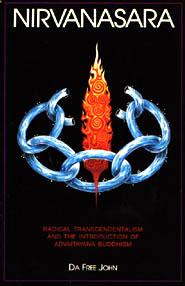
Radical
Transcendentalism and the Introduction of Advaitayana
Buddhism
Da Free John (Adi Da Samraj) – 1982
Table
of Contents
IV
God as the Creator, the Good, and
the Real
Conventional religion originates in
the consciousness that characterizes the earlier stages of
life. Thus, it is ego-based and it serves the functional
desire of the manifest or phenomenal self to be protected,
nourished, pleasurized, and ultimately preserved.
The phenomenal self or egoic
(self-centered) body-mind is the source of conventional
religion as well as all of the other ordinary and
extraordinary pursuits of born existence in the first six
stages of life. Therefore, it is not God but the ego
(perhaps gesturing conceptually toward God) that is the
source and fundamental subject of popular religion as well
as higher mysticism. Real spirituality, true religion, or
Transcendental Occupation begins only when the egoic
consciousness (with all of its mind, emotion, desire, and
activity) is thoroughly understood and inherently
transcended. For this reason, only the radical Teaching of
the Wisdom of the seventh stage of life directly serves the
process of actual God-Realization. All other forms of
doctrine or instruction serve the purposes of the first six
stages of lifeall of which are founded on manifest
egoity and conditional attention.
It is the culture of conventional
religion that promotes the conventional ideas about God. The
principal conventional God-idea is that God is the Creator
(or intentional Emanator) of the worlds and all beings. Such
seems an obvious idea to the bodily ego, trapped in the
mechanics of the perceptual mind and the material or
elemental vision. The ego is identified with embodiment, and
the idea of the Creator-God is developed to account for this
fact and to provide a conceptual basis (in the form of the
idea of the ego as God-made creature) for the appeal to God
to Help the ego in this world and in the yet unknown
after-death state.
The difficulty with the Creator-God
conception is that it identifies God with ultimate causation
and thus makes God inherently responsible for the subsequent
causation of all effects. And if God is responsible for all
effects, then God is clearly a very powerful but also
terrible Deitysince manifest existence tends to work
equally for and against all creatures.
Therefore, the Creator-God idea is
commonly coupled with the idea of God as Good (and thus both
opposite and opposed to Evil). If the Creator-God is
conceived to be Good (or always working to positively
create, protect, nourish, rightly and pleasurably fulfill,
and ultimately preserve all of Nature and all creatures),
then the ego is free of the emotional double-bind and the
anger and despair that would seem to be justified if God is
simply the responsible Creator of everything (good, evil,
bad, or in between). Therefore, conventional theology, most
especially as it has tended to develop under the influence
of the Semitic religions of the Middle East, is founded on
the ideas of God as Creator and God as Good (or Good
Will).
For further reading go to:
